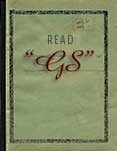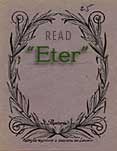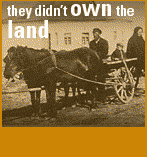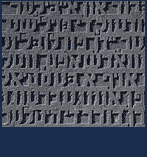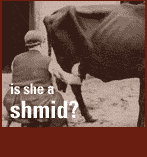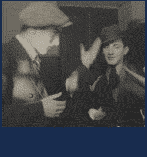

Introduction
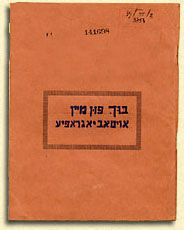
"G.W." wrote his autobiography in Yiddish in 1939, at the age of 20, as an entry in an essay contest sponsored by the YIVO Institute for Jewish Research. YIVO, then located in Vilna, Poland, invited young Polish Jews between the ages of 16 and 22 to write and send in their life stories.
I am sure that you will find my work very useful, although the language is perhaps not very good. But this isn't my fault, as I never attended a Yiddish school, and therefore my writing is full of mistakes - please take this into account. If you can, please send me some material that will teach me how to write Yiddish well. That would be a great thing for me to have, and I would be forever grateful to you.
My First School Days
G.W. spent part of his childhood in a very small town in the province of Lublin, a large city. Jews made up the majority of his town's population.
When I was three years old my mother took me to kheyder  . To get to the melamed
. To get to the melamed  , who lived not far from us on Siedlecka Street, we went through a small passageway between two brick buildings, behind which were several very low, crooked, old houses surrounded by a wire fence.
, who lived not far from us on Siedlecka Street, we went through a small passageway between two brick buildings, behind which were several very low, crooked, old houses surrounded by a wire fence.
We entered one of these houses. I stood on the doorstep with my head hung low, my finger in my mouth, angry, as if I somehow understood that I was being robbed of part of my childhood freedom.
The teacher was a short man with a long red beard. He wore a traditional Jewish cap and a long coat tied with a sash. The teacher called me over to the table, where about ten children were sitting, and introduced me to the first letters of the alef-beys  . He told my mother to leave me at the kheyder, and she went home.
. He told my mother to leave me at the kheyder, and she went home.
I sat there silently, looking around to see where I was. It was a small, low room. On the right, near the window, was a cot, and near that was the table where the children studied. On the other side was a long bench, and at the narrow side of the table was the teacher's chair. Opposite this, near the wall and in the very middle of the house, was a small chest with an iron band all around it. Near that was a door leading to an alcove. In the corner, opposite the door through which we entered, was the fireplace, which also served as a cooking stove.
It was nice and warm in there, and it reminded me of the song that my mother used to sing: "On the hearth, a fire burns, and it's hot in the house." The teacher recited a blessing with the children. I already knew it, because my mother had taught it to me, and I said it along with them. I went to this kheyder for two months and learned the alef-beys.
From the first day I went to kheyder I felt at home with the other children. We all played together, jumping up from the ground onto the top of the chest and back down again. On one of those jumps I smashed into the corner of the chest and cut my forehead, right in the middle. I started bleeding, and the teacher's wife applied cold water to my head. In the meantime the teacher sent for my mother, and I was taken to the feldsher  , who stitched me up and bandaged me. It really hurt, and every day I went to be rebandaged.
, who stitched me up and bandaged me. It really hurt, and every day I went to be rebandaged.
I didn't go back to this kheyder anymore, and the cut left a permanent scar in the middle of my forehead. That's why this kheyder has remained so vivid in my memory.
After my head had healed my mother took me to another kheyder, with a better melamed, where I learned how to recite prayers. He was an older man with a gray beard, and he was very strict. He maintained authority with a leather whip that lay on the table. His face looked severe and angry, and all the children trembled at his glance. In addition, he had a particular practice of keeping delinquents after class.
We had lessons together twice a day: first, in the morning, and then, after he finished working with each one of us separately, we would have a second lesson together. This meant that we had to be in kheyder almost the entire day. But because we weren't used to this we would run outside, and for this the teacher often struck us with his whip.
Once, I got into a lot of trouble by talking a few children into going outside and, one by one, we sneaked out of the kheyder. We ran off somewhere far away to play. As usual, the teacher ran around looking for us and couldn't find us. When we returned later he gave each of us a beating and asked who had told us to run away. One of the children unintentionally let it slip that I had put them up to it, and the teacher punished me by keeping me after school.
It was a summer evening and already quite dark, and I had to sit there alone in the kheyder. I was getting very hungry, and the teacher still hadn't said I could go home. I started crying, and he came over to me and told me never to do that again, and then he let me go.
We Move to Wlodzimierz
G.W.'s father, a shoemaker, found it increasingly difficult to earn a living in their town. He and his partner Hershl went to the larger town of Wlodzimierz in search of business. When they were somewhat established there, they sent for their families.
At the end of 1925 we all left our home town together: my mother, my two little brothers, and I, with Hershl's wife and her two children.
It was freezing outside and a fine snow was falling. The wind was blowing fiercely. We all sat in the sleigh together. We children were covered with pillows, because we were still weak from the measles and could barely breathe. The train station was four kilometers away.
The coachman drove the horses quickly, and in an hour we were at the station in Niemojko. It was a small, low, wooden building, not far from the tracks. We raced inside the station to a big empty room with several long benches on the sides along the walls. Not far from the ticket window there was a warm stove. We ran over to it to warm ourselves. My mother and Hershl's wife went to the ticket window to buy tickets.
There was still half an hour until the train left and we sat and waited patiently. My mother's younger brother had come to the train station with us. He said goodbye to us and gave candies to all of us children. My mother and Hershl's wife bought the tickets and came back to wait with us. Many people stood at the ticket window buying tickets. The train whistle blew; it was coming. Soon it whistled again and stopped. My uncle helped us get on board. He said goodbye to all of us once more and dashed off the train.
Soon the train whistled again and moved. It was dark all around. It was nighttime; I looked out the window and saw nothing. We were moving. The other children and I went to sleep. My little brother slept in my mother's arms. I lay on a bench. In my sleep I imagined that I was with my father, and we were all laughing and happy together.
In the middle of the night we arrived in Brzesc nad Bugiem, where we had to switch to another train. We went into the station to wait. It was a large, beautiful station with many doors and rooms, brightly lit with electric lights. It was the first time I had ever seen them, and the brightness was blinding.
We waited for about a quarter of an hour until our train came. Taking all our belongings, we boarded the train, which went directly to Wlodzimierz. As we traveled it grew light. I sat and looked out the window, watching as we quickly passed through regions I had never seen before: snowy fields, villages, towns that couldn't be distinguished from each other.
Finally we arrived at the station in Kowel, where the train stopped for a quarter of an hour. From there it was only five more hours to Wlodzimierz. We traveled on, the train puffing hard, as if it were exhausted from the long journey that took almost a full day.




